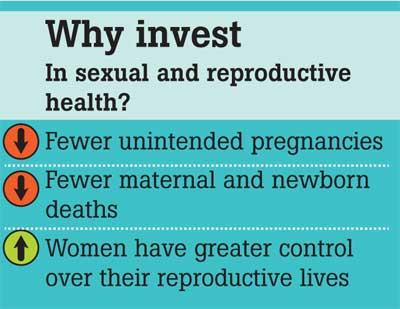Reply To:
Name - Reply Comment
Last Updated : 2024-04-20 08:36:00
 Forty-year-old Kavitha (pseudonym) was gripped by panic when she learnt she was pregnant for the sixth time. What made her most fearful was that she was ill-equipped to support and sustain yet another child, for she toiled as a domestic worker without sufficient income, living with a husband whose employment was casual and insecure, and within these means, already taking care of five children.
Forty-year-old Kavitha (pseudonym) was gripped by panic when she learnt she was pregnant for the sixth time. What made her most fearful was that she was ill-equipped to support and sustain yet another child, for she toiled as a domestic worker without sufficient income, living with a husband whose employment was casual and insecure, and within these means, already taking care of five children.
Nineteen-year-old Nuwanthi (pseudonym) had a similar reaction when she found out she was pregnant. She and her partner had been relying on withdrawal (known as “coitus interruptus”) as a way of preventing pregnancy. Following the news of their pregnancies, pressure mounted within their relationships and put immense strain on them both. They began to fight like they never did before and Nuwanthi reports how she now had an added fear of separation with her partner. The entire experience rattled her as she’d never felt so nervous by situations that seemed out of her control.
The experiences of Nuwanthi and Kavitha reflect those of many women around Sri Lanka – those who are faced with unintended pregnancies which often occur due to the fact that they and/or their partners are not using a suitable and effective form of contraception.
With restrictive laws on abortion (which result in women covertly seeking services that can be expensive beyond their means and can sometimes be unsafe), a lack of quality ‘comprehensive sexuality education’ in school curricula and cultural and religious norms that preclude constructive and informative discussions on family planning, individuals are often denied key facets of their sexual and reproductive health and rights (SRHR).
History of family planning in Sri Lanka
Family planning as defined by the World Health Organisation (WHO) allows people to attain their desired number of children and determine the spacing of pregnancies, and is achieved through the use of contraceptive methods and treatments of infertility (or rather, subfertility). The regulated, well-managed planning and implementation of family planning programmes aim at ensuring individuals are informed of the availability of family planning methods, where to obtain them, potential side effects and other possible methods they could use if the ones they used were not suitable.
It is undeniable that contraceptive methods use has historically been imposed forcibly and exploitatively in a range of contexts worldwide. Research done on the subject has identified socially and politically disadvantaged groups such as racial and ethnic minorities (often of low-income) as targets of forced sterilisation programmes. In Sri Lanka, financial incentives had (from 1979) been used for sterilisation, yet this was discontinued and does not exist today. Following the 1994International Conference on Population and Development (ICPD), Sri Lanka was seen to have shifted from a demographically-driven approach to family planning to one based on human rights and ensuring that the needs, aspirations and circumstances of each woman and of couples were met.
In the Sri Lankan context, family planning has historically been identified as an integral component of maternal and child healthcare services. The first family planning clinic in the country was reported to have been established in 1932 by Dr. Mary Ratnam, yet was abandoned during World War II. In 1953, services resumed through the Family Planning Association and were integrated into the State sector’s maternal and child healthcare programme. In 1968, the Health Ministry established the Family Planning Bureau which was later renamed the Maternal and Child Health Bureau, and in 1972, took the name Family Health Bureau which remains to this day.
Contraceptive methods are typically classified into traditional (natural) and modern (artificial). Modern methods include oral contraceptive pills, Depot Medroxy Progesterone Acetate (DMPA) injection, Intrauterine Devices (IUDs), hormonal implants, female and male condoms, male and female sterilisation and emergency contraceptive pills. Traditional methods include withdrawal (coitus-interruptus), abstinence, Standards Day method (previously known as having sex within the “safe period”), Basal Body Temperature (BBT) method, Cervical Mucus(Billings) method and Lactational Amenorrhoea method. These are considered less-effective and less-reliable than modern methods because the scope of human error is large.
The use of effective forms of contraception is becoming increasingly important in a context where many individuals desire to delay becoming pregnant (due to pursuing studies/gaining employment/the need to be financially stable) or due to health issues affecting either or both partners.
In spite of a public healthcare system that grants universal access, and the country’s impressive health indicators and success in reducing maternal and infant mortality to very low levels, there exists an unmet need for family planning, especially for specific subsections of the population such as youth, sexually-active single women, widowed, divorced and separated women, working women, older women, and men.
Research on SRHR in Sri Lanka indicates that though the maternal mortality ratio is relatively low, one-third of preventable maternal deaths could be averted through proper family  planning practices. The abortion rate in Sri Lanka is estimated to range from 600-1,000 per day, yet figures are not accurate due to the restrictive laws and social stigma surrounding the topic, which mean numbers are likely much higher. In addition to an unmet need, according to the 2016 Demographic and Health Survey (DHS), the discontinuation of contraceptive methods 12 months after starting them stood at 29%. Of this, 15% of respondents reported ceasing method use due to “health concerns or side effects.”
planning practices. The abortion rate in Sri Lanka is estimated to range from 600-1,000 per day, yet figures are not accurate due to the restrictive laws and social stigma surrounding the topic, which mean numbers are likely much higher. In addition to an unmet need, according to the 2016 Demographic and Health Survey (DHS), the discontinuation of contraceptive methods 12 months after starting them stood at 29%. Of this, 15% of respondents reported ceasing method use due to “health concerns or side effects.”
Discontinuations were also reported due to a “lack of access/ [services being] too far” or because users “wanted a more effective method.”
Reproductive Health Specialist Dr. Sumithra Tissera describes how most women she encountered in her career learnt about contraceptive methods through hearsay (particularly via their friends/people they know). This information is therefore sometimes inaccurate. In describing which method individuals should use, Dr. Tissera comments that the method should be specific to the client and that there is no universal method that would be best suited for all individuals.
“The service provider’s role is to provide correct and adequate information and guide the patient if the method of their choice is not the suitable one due to medical reasons,” she noted. “The client should be allowed to ask questions to verify their concerns.” The information that a provider should give the client includes the methods available, cost (if any), effectiveness of the method, side effects and when to seek medical advice/ discontinue the method. Dr. Tissera notes that if the client is provided with all necessary information and is given the freedom to choose the method of their choice, discontinuation rates become very low.
As noted in the 2016 DHS, only 53% of ever-married women currently using modern contraceptive methods were informed about the potential side effects or other problems associated with the method prior to use and just over half (51%) were informed about what to do if they experienced such side effects. Only 42% of them were informed of the availability of other methods that could be used. Dr. Tissera emphasises that adequate information about the method itself, including side effects, contraindications, when to discontinue and what one should do if there were an issue when using a modern contraceptive method, allows an individual to make an informed decision about which method to use.
As described in the National Family Planning Programme Review of 2017, in the last decade, a number of issues pertaining to family planning has arisen in Sri Lanka such as quality of services, misconceptions and/or misinformation about side effects, cultural and religious beliefs and negative perceptions about the objectives of the such programmes. Additional barriers are personal and partner opposition to contraceptive use, reliance on traditional methods and a socio-cultural context in which shame and stigma are high and heavy, deterring many from accessing these services where they exist.
Much of the current discourse on family planning frames it as a means of controlling subsets of the Sri Lankan population, and that such a discourse dominates mainstream (and often social) media precludes any discussion on the primary foci of family planning: ensuring the health of individuals is safeguarded and that their rights are ensured. It is important that the available family planning programmes are informed by a rights-based framework and that access is expanded so as not to exclude individuals from accessing accurate information and quality services.

Add comment
Comments will be edited (grammar, spelling and slang) and authorized at the discretion of Daily Mirror online. The website also has the right not to publish selected comments.
Reply To:
Name - Reply Comment
On March 26, a couple arriving from Thailand was arrested with 88 live animal
According to villagers from Naula-Moragolla out of 105 families 80 can afford
Is the situation in Sri Lanka so grim that locals harbour hope that they coul
A recent post on social media revealed that three purple-faced langurs near t